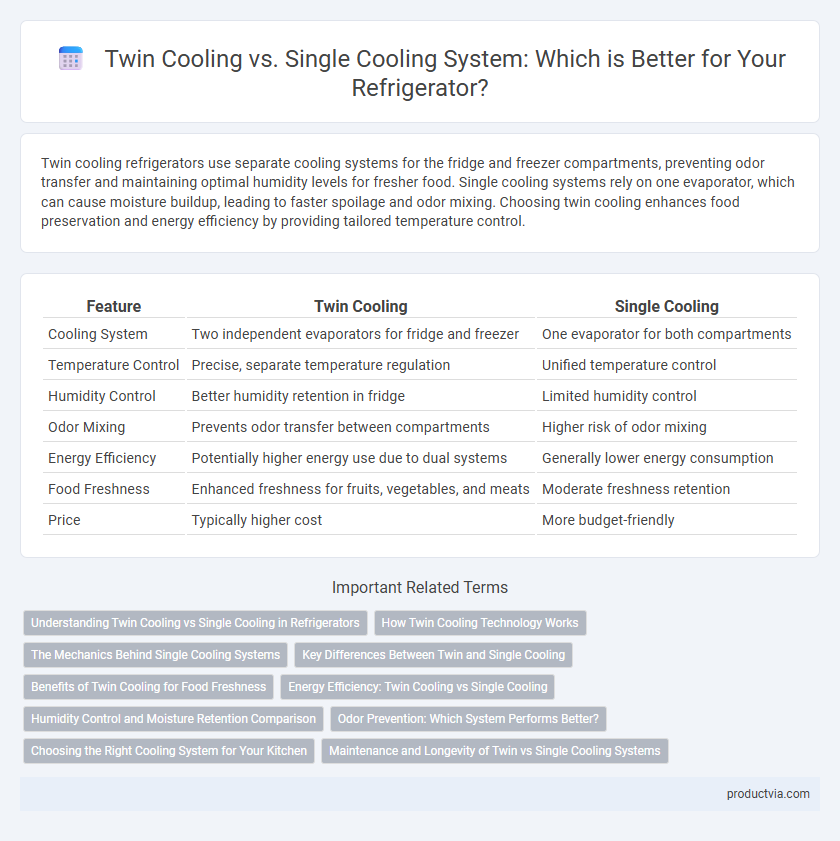Twin cooling refrigerators use separate cooling systems for the fridge and freezer compartments, preventing odor transfer and maintaining optimal humidity levels for fresher food. Single cooling systems rely on one evaporator, which can cause moisture buildup, leading to faster spoilage and odor mixing. Choosing twin cooling enhances food preservation and energy efficiency by providing tailored temperature control.
Table of Comparison
| Feature | Twin Cooling | Single Cooling |
|---|---|---|
| Cooling System | Two independent evaporators for fridge and freezer | One evaporator for both compartments |
| Temperature Control | Precise, separate temperature regulation | Unified temperature control |
| Humidity Control | Better humidity retention in fridge | Limited humidity control |
| Odor Mixing | Prevents odor transfer between compartments | Higher risk of odor mixing |
| Energy Efficiency | Potentially higher energy use due to dual systems | Generally lower energy consumption |
| Food Freshness | Enhanced freshness for fruits, vegetables, and meats | Moderate freshness retention |
| Price | Typically higher cost | More budget-friendly |
Understanding Twin Cooling vs Single Cooling in Refrigerators
Twin cooling refrigerators use two separate evaporators to individually control the temperature and humidity in the fridge and freezer compartments, preventing odor transfer and maintaining optimal freshness. Single cooling systems rely on one evaporator for both compartments, which can lead to moisture imbalance and mixed odors. Choosing twin cooling technology improves food preservation by providing tailored environments for different types of food.
How Twin Cooling Technology Works
Twin cooling technology in refrigerators uses two separate evaporators to cool the fridge and freezer compartments independently, ensuring precise temperature and humidity control. This system prevents odor mixing and maintains optimal moisture levels, which helps keep food fresher for longer. Compared to single cooling systems that use one evaporator for both compartments, twin cooling offers enhanced energy efficiency and better preservation of food quality.
The Mechanics Behind Single Cooling Systems
Single cooling systems in refrigerators operate with a single evaporator and a shared airflow that cools both the refrigerator and freezer compartments, leading to uniform temperature control but potential moisture transfer between sections. The shared airflow can cause odor mixing and frost buildup in the freezer due to moisture migration. This simpler mechanical design is cost-effective but may compromise optimal humidity and freshness for stored food compared to twin cooling systems.
Key Differences Between Twin and Single Cooling
Twin cooling refrigerators use separate evaporators for the fridge and freezer compartments, ensuring optimal humidity and temperature control to prevent odor mixing and enhance food preservation. Single cooling systems rely on one evaporator for both compartments, which can cause uneven cooling and moisture transfer, leading to quicker spoilage. The twin cooling system offers superior energy efficiency and maintains freshness longer by independently regulating each compartment's environment.
Benefits of Twin Cooling for Food Freshness
Twin cooling systems in refrigerators use two separate evaporators for the fridge and freezer compartments, maintaining optimal humidity levels and preventing odor transfer between sections. This technology helps preserve food freshness by reducing moisture loss and keeping fruits, vegetables, and meats fresher for longer periods compared to single cooling systems. Consistent temperature control and separate air circulation minimize bacterial growth and food spoilage, enhancing overall food quality.
Energy Efficiency: Twin Cooling vs Single Cooling
Twin cooling refrigerators use two separate evaporators to independently control the temperature and humidity in the fridge and freezer compartments, resulting in optimized energy efficiency and reduced cooling loss. Single cooling systems rely on one evaporator for both compartments, often causing temperature fluctuations and increased energy consumption to maintain desired cooling levels. Studies show twin cooling systems can reduce energy usage by up to 15% compared to single cooling models, making them a more energy-efficient choice.
Humidity Control and Moisture Retention Comparison
Twin cooling refrigerator systems utilize separate evaporators for the fridge and freezer compartments, enabling precise humidity control and superior moisture retention by preventing odor mixing and reducing air circulation between sections. Single cooling systems rely on a single evaporator, often causing air exchange between compartments, which leads to lower humidity levels and increased moisture loss in the refrigerator. Consequently, twin cooling technology helps maintain optimal freshness and crispness of stored food by preserving higher humidity levels and minimizing dehydration.
Odor Prevention: Which System Performs Better?
Twin cooling systems use separate evaporators for the fridge and freezer compartments, preventing odor transfer between sections and maintaining optimal humidity levels, which effectively reduces unwanted smells. Single cooling systems rely on a shared airflow, allowing odors from the freezer to mix with those in the refrigerator, often resulting in cross-contamination of smells. Therefore, twin cooling technology outperforms single cooling in odor prevention by isolating compartments and preserving individual freshness.
Choosing the Right Cooling System for Your Kitchen
Twin cooling systems use separate evaporators for the fridge and freezer compartments, maintaining optimal humidity and preventing odor transfer, which preserves the freshness of food longer. Single cooling systems rely on one evaporator for both compartments, potentially causing moisture loss and mixing of smells, but they generally consume less energy and have a simpler design. Selecting between twin and single cooling depends on your food storage needs, kitchen environment, and budget, with twin cooling ideal for preserving diverse food types and single cooling suitable for basic refrigeration requirements.
Maintenance and Longevity of Twin vs Single Cooling Systems
Twin cooling refrigerator systems reduce maintenance needs by independently controlling humidity and temperature in separate compartments, preventing odor mixing and frost buildup. This design enhances the longevity of food preservation components by minimizing wear caused by temperature fluctuations, unlike single cooling systems that often require more frequent defrosting and cleaning. As a result, twin cooling systems generally offer improved durability and lower overall maintenance costs compared to single cooling systems.
Twin cooling vs single cooling for refrigerator system Infographic

 productvia.com
productvia.com